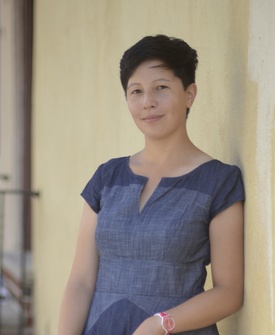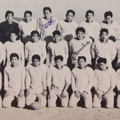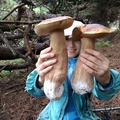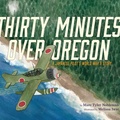Monnier: How do you describe your identity when you describe yourself? What words do you like?
Tsurumi: Well, it depends on who I'm talking to or why I'm describing it. If it's with a friend or somebody I'm close with or in the context of this interview, it's a longer conversation, right? If it's somebody who's like, 'Well, what are you?" which is the common thing, I think, if you're mixed-race in America, then it's like, "Well, my dad's Japanese and my mom's Jewish. I'm from New York. I'm a person..." So I'm not either—I am Jewish, but also I am Asian American. There's also code-switching that happens, right? I have privileges based on how dark my skin is, which is...not, so there are different things that happen depending on which group of people I'm with or what's happening in the context. Also, this might be really ridiculous, but as somebody who grows up in the suburbs, you're also kind of always figuring out who you are because you come from a strange place. It's a community that dissolves after you graduate and people move away. It's not like, my ancestors have come from this land. It's like, no, we went to Blockbuster…
Monnier: And now it doesn't exist anymore.
Tsurumi: Yeah, so you're always kind of figuring out what your own priorities are and what's meaningful to you and what actually matters, which I think is good because uncertainty makes you ask questions all the time. You just can't assume this is my thing, here we go. On the other hand, there are definite things I was raised with, like my dad loves watching these historical samurai TV shows, almost like samurai westerns. Growing up, I thought they were very formulaic and ridiculous, but when I see these now, I'm like, oh, right! I have these associations with going to the Japanese food store and seeing the weird VHS section and certain kinds of candy or—like I have a daruma on my desk right now because I'm starting a new project, because we grew up with that. So the things that I remember from my childhood feel very personal and welcoming to me, but I don't know where that puts me in terms of Japanese culture in general. How do you navigate it?
Monnier: Well, it's interesting to hear you talk about it with so much nuance, like it depends on code-switching, on where you are, your relative privileges depending on what group you're in because I think that's the reality of being mixed, that there's uncertainty that you can't really put a definite label on things because as soon as you do, someone can question you or you can go to a different place and in that context you're someone different, you know? So I have felt that anxiety of, what labels do I put on myself and am I allowed to do that or will someone kick me out? But I think looking at it on an individual basis depending on where you are is probably the healthiest way to navigate it because what else can you do?
Tsurumi: I don't know, I think at least, especially as I get older, I just want to be able claim myself. Whatever I am, even if I'm wrong sometimes, I am still me, and I can occupy that space even if other people have opinions about it, and most people don't. I don't think most people care.
Monnier: Have you felt this secure about it for a long time, or is that something that came with time?
Tsurumi: I also deal with anxiety, so I know more about myself and I get better at being myself and just kind of occupying my own space every single day, every new year. The older I am, the better I get at it because it's a kind of practice, right? And it's really nice being an adult and learning that. I struggle with it. I hear from—there's a publisher, she's Canadian Japanese, named Annie Koyama. She is an absolute treasure. I was talking with her yesterday and she was telling me how great it is to be 50 and truly not care anymore about what people think about you.
Monnier: I’ve really enjoyed the photos you share on Instagram of picture books that speak to you, like the ones by Shinsuke Yoshitake.
Tsurumi: Yeah, he is fantastic. He wrote conceptual books. There was a whole series. He wrote one called, Can I Build Another Me? which is fantastic, speaking of identity. He's really funny too. He has this great book that was translated into English called Still Stuck about this kid who gets stuck in his clothes taking them off, and it's brilliant.
Monnier: What are other books that have inspired you over the years?
Tsurumi: There are so many books that I love. When I was growing up, I was all about Edward Gorey and Ellen Raskin and Richard Scarry. I think my favorite book was the Usborne Illustrated Encyclopedia, which is super nerdy, but it's basically a big book of comics. I like artists and illustrators that play around with comics and picture books so that they're mixing up how they're incorporating text and images on the page—like John Hendrix, who does that in a really cool way. There are a bunch of French cartoonists like Lewis Trondheim that I really love. Oh, and Eleanor Davis. She's a cartoonist's cartoonist, like she knows how to get to the heart of what she's trying to say on the page. She has this great book called You & a Bike & a Road about a bike trip she took from Arizona to Georgia, and it's exquisite.
Monnier: How did you start drawing?
Tsurumi: The answer I keep going back to about that question is something the head of my MFA program, Marshall Arisman, said, that when you start out as a kid, everybody draws, but most people stop. So the people who don't stop are the ones who become illustrators or artists. I've always been drawing as far back as I can remember, which is great because then you can look back and be like, oh god, I was so terrible. I'm so much better now. And then years later you look back at what then was the best thing that you'd done and you're like, oh god, that's so terrible, I'm getting better. It's a long game.
Monnier: In your behind-the-scenes comic about the making of Crab Cake, you wrote about how you kept finding yourself drawing this little baking crab. Were there things like that earlier in your life, that you drew over and over?
Tsurumi: Let's see, I definitely had a kangaroo phase. It's funny because I'll look back at stuff from when I was a kid, and it's amazing what hasn't changed, like I've always been really interested in people or animals or characters. There's not a lot of landscapes or settings or buildings or cars or robots and stuff in my art. Because I'm always just fascinated with how people are moving or the things they're saying or the faces they're making, so that's really been my constant throughout. Now I am expanding a bit more with other stuff. And I've always had stuff that was narrative, that was telling a story or about to tell a story.
Monnier: That's interesting that you mention people because I remember your comic from The Believer ended with the line, "So everything is just: people." I really liked it, and this is kind of embarrassing, but I made a vision board at the beginning of the year and that's one of the things I cut out and put on it. I think what I like about it is that it makes things larger and smaller at the same time.
Tsurumi: Oh! That’s great, thank you. Yeah, that's a good way of putting it. In terms of history, everything is people, right? That includes the way that your grandma put on the radio in the morning when she made coffee, which is not going to be recorded in a textbook, but it's meaningful, absolutely. And it includes people deciding not to nuclear-bomb Kyoto because a guy went on his honeymoon there and he said it's beautiful and they wouldn't be able to rebuild that stuff. Things that people have decided and done throughout time are amazing, like in New York City, everyone used to move on the same day, so everyone would be like throwing their belongings out into the street and it would be like a day-long riot for no real reason, but it was just a thing, right? There are these decisions and small ways of living that people perpetuate that are just very human and they can be wonderfully kind and defiant and cool, and I'm so inspired by people who do that, like that woman who is a real estate agent in Chicago who just bought 30 hotel rooms for homeless people during the Polar Vortex.
I saw a really cool show this summer in Philadelphia by the drag artist Taylor Mac, and they said, "You do not need permission to participate in the creativity of your own survival," and I thought that was amazing. And to quote another source, I read Rebecca Solnit's A Paradise Built in Hell, about the extraordinary communities that arise in disaster, how, when you have a cataclysm that happens, people immediately rally. It's not something someone has to come along and tell them how to do, humans do this automatically, which is glorious, and I wanted to celebrate it in the book. And then you also have people who are like, I'm going to do this for my community but not these other people who I identify as the other; I'm going to be horrible to them. Or you have authorities coming down and mistrusting this kind of beautiful, scraggly spirit because it looks a lot like a revolution, and they send in troops and things go pear-shaped very quickly. People are capable of making these choices. They are capable of extraordinary, heroic amounts of cooperation or just beautiful things that people do on the everyday. Like we all know someone who has been sick or has a new baby and people figure out a way to get them food or figure out a way to watch their kids, and that's heroic. That's amazing and gorgeous and just the best thing ever, and it's so ordinary, right?
Monnier: It's interesting in the context of this book too, because Crab Cake includes some great ocean animal facts, and it's fascinating how different species have some processes for how to make things work that we can't even imagine as humans or other ones that are really similar to humans’. What was your research process like for finding these facts and deciding which ones to include?
Tsurumi: I started with just this idea of a crab, so of course it had to be an undersea community, and then I kind of built in the emotional architecture of the story and went to go find things to fill it. So I knew I wanted to build up this rhythm of kind of documentarian, Attenborough-an "they do this, they do this, they do this, and crab bakes cakes, and they do this, and they do that, and crab bakes—" you know, and then I went to plug in the details. Things happened that were hilarious, like now I know that toadfish are eaten by dolphins, but I accidentally put them together in the book, which is fine. This is a children's book, so really it's a metaphor about human behavior, otherwise all these animals would just be eating each other. But yeah, it was really cool to research and find out how incredibly strange and interesting the underwater world is. Like I found out that moray eels and groupers will cooperate to hunt, and they have the best faces—you've seen a moray eel's face, right? Oh my god, the ocean is just amazing. That's why it's really sad and horrifying when you realize how much of it is quickly being lost due to global warming or pollution or the plastic waste that goes into the water. But I look forward to learning more. It's always interesting learning about the natural world, which is our world too. And about cakes. I don't actually bake, which is hilarious.
Monnier: Oh yeah, I didn't even think about what your research process was like for the baking part of it. Do you watch The Great British Bake-Off?
Tsurumi: Of course, yeah, it's very cheesy to be all into that, but yeah, I love watching it. And that's what people say about The Great British Bake-Off, that it's great because you see people cooperating and just being nice to each other. I read Sue Perkins' memoir, which is really cool. She's one of the original hosts. She said that she and Mel [her fellow host], whenever somebody would be crying or just having a moment, they would run over and console them, but they would also start cursing large pharmaceutical companies or large brands because the scenes would have to be cut, like you can't air a segment where all of a sudden Sue Perkins starts cursing Merck or something.
Monnier: That's sweet and very creative.
Tsurumi: Right? These bakers must have had an interesting experience where they're getting overwhelmed and all of a sudden there's this comedian next to them, cursing. It's a lovely way to be with other people and I feel like that should be celebrated more.
© 2019 Mia Nakaji Monnier






